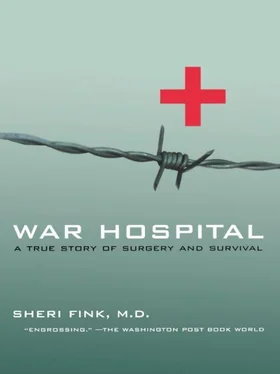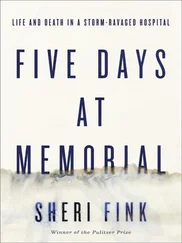Ilijaz greeted Nijaz and studied him. Before the war, the thin, dark-haired physician had suffered a heart attack and wasn’t well enough to work full-time. It shocked Ilijaz to see him looking fresher than ever, apparently revitalized by the fact that people needed him.
Because Nijaz was more experienced and had better equipment, Ilijaz had sent several heavily injured patients to him over the mountain paths. One, just a few days ago, had a broken femur. Nijaz told Ilijaz the man was improving.
“It must be hard to work under fire every day,” Nijaz said. For the first time in the six weeks since the war began, Ilijaz had a physician colleague with whom to commiserate. Together, they quickly cleaned up Akif’s wounds and rebandaged him. Ilijaz and the volunteers from Gladovići had to return before nightfall.
Ilijaz was somewhat sorry to be leaving. How much more he could accomplish pooling his knowledge and resources with other physicians in a central location. Out of Srebrenica’s original forty-five doctors, pharmacologists, and dentists, Ilijaz knew of at least three who remained in the area besides Nijaz and Fatima. But if they all left their villages for Srebrenica, who would care for injured patients who couldn’t easily be transferred here? Besides, Srebrenica’s hospital and clinic buildings remained closed and abandoned in the northern end of town, still too dangerous to visit.
Something needed to change, but for now, Ilijaz, Nijaz, Fatima, and the others could do nothing but work alone.
THE SAME FIRST WEEK OF JUNE 1992, Eric Dachy, quite unaware of the goings-on in Srebrenica, was feeling pretty useless. With Bosnia engulfed in all-out war, distributing drugs and medical supplies to hospitals in peaceful Serbia seemed rather beside the point. Getting aid into Bosnia, though, would require navigating through a maze of multiple armed groups and rapidly shifting combat zones that were only now starting to stabilize into recognizable front lines. Serb nationalist military forces blocked access for humanitarian aid, and rumors abounded of widespread atrocities against civilians. It mattered little that two weeks ago the International Committee of the Red Cross convinced all warring parties to agree to respect the Geneva Conventions guaranteeing the protection of the wounded, sick, prisoners of war, and civilians.
The day of the agreement, Bosnia and Herzegovina, Croatia, and Slovenia became United Nations member states; their existence as independent countries was now recognized worldwide. This also gained them the right to self-defense under Article 51 of the U.N. charter. However, the arms embargo that had been placed on Yugoslavia the previous year was still in effect for the entire region, and Bosnian government forces remained at a significant disadvantage in heavy weaponry compared with the Yugoslav-backed Serb forces.
Just days after Bosnia’s recognition as a U.N. member state, both the U.N. High Commissioner for Refugees and the International Red Cross announced the suspension of their Bosnia operations. Persistent violence and lethal attacks on aid workers and aid convoys led to the decision. To the great disappointment of the local population, the U.N. Protection Force, UNPROFOR, which had been based in peaceful Sarajevo for operations in war-torn Croatia, followed suit, pulling out all but a skeleton force from the Bosnian capital and transferring its headquarters to Belgrade, Serbia. Its remaining 120 peacekeepers were practically the only internationals left in Sarajevo, and, without a clear mandate to work in Bosnia, were nearly powerless in their efforts to mediate ceasefires and deliver humanitarian aid.
The headquarters of Doctors Without Borders’s semi-independent national sections split over how to respond to Bosnia’s war. Leaders of the French section halted all aid activities. “This can’t go on,” the president of MSF France, Rony Brauman, told a reporter for Agence France-Presse, the leading French news agency. “We (the MSF) are stopping our work, because there is a failure and a cowardice among the European Community that borders on monstrosity.”
The international community needed to stop the war and atrocities against civilians, he said. “The humanitarian and legal pretext has gone on long enough and what’s needed now is a military intervention,” Brauman said, shocking his colleagues in the aid community, “because we have all these dead and injured, and what we see among the international community is a complete void, indifference, people bashfully looking elsewhere.”
The leaders of MSF Belgium had a different philosophy. Let the French give press conferences and write articles and books; the Belgians would act in the war zone. Eric, though he worked for the Belgian section, shared many of the French leader’s opinions. Providing humanitarian aid was not the way to end this war. Still, he clung to the hope that humanitarians could accomplish something important in Bosnia, and not only with aid. He had another idea, an activist idea: to interpose between victims and aggressors.
The Doctors Without Borders headquarters in the Bosnian capital, Sarajevo, was burned and looted. The newly fledged Bosnian army, loyal to the Bosnian government, had managed to keep control of the city, but Serb nationalist forces ringed its heights, shooting and shelling at the city below. All MSF internationals had pulled out for safety reasons not long after the start of the war. What remained of the MSF mission was its local staff members, who’d relocated their office to the civilian hospital, the biggest and most advanced in all of Bosnia, and alerted Eric in Belgrade that it had a critical shortage of kidney dialysis fluid. Eric sent his translator combing through the chemical laboratories of Serbia looking for the exact type and concentration of fluid that would work in the hospital’s machine. If the hospital had to stop providing dialysis, then those in the capital who had kidney failure and depended on the procedure to filter dangerous toxins from their bloodstreams would die.
Eric’s translator found a local factory that produced the needed fluid, and Eric purchased more than 1,000 liters. He argued it, along with cases of external fixators, surgical kits, wound dressings, and some medications, onto a convoy of French peacekeeping forces headed to the Bosnian capital the first week of June. Then he set about seeking a way to get himself to Sarajevo to assess conditions in the city and the feasibility of supplying it regularly with medical aid from Belgrade.
He found his ticket a few days later with a bizarre lot of Bosnian Serb liaisons who’d congregated in a palatial, former Communist government villa in the nicest part of Belgrade. A large, scowling man, whom the aid workers jokingly referred to as Bluto, after Popeye’s parrot-toting archrival, menaced Eric when he entered. Eric asked for permission to travel to Bosnia. Bluto and the other Serb officials grilled him. What did he want to do there? Why did he want to go? Eventually they relented, and the trip was set for the second week of June. Eric kept the date, despite suffering from a painful bout of tonsillitis. He loaded MSF’s 4WD Toyota Land Cruiser with provisions for the local MSF team and boxes and boxes of the best surgical material in MSF’s warehouse. He and three colleagues drove across the Drina River into Serb-held Bosnia. They didn’t know exactly how they’d get across the front lines to reach the capital, but Eric knew that U.N. Protection Force soldiers had a base nearby in the hilly Sarajevo suburb of Lukavica. When he reached it, he was appalled to discover that the UNPROFOR soldiers were sharing a barracks with the separatist Serbs. They couldn’t have avoided seeing Serb artillery emplacements slam shells into the hospital pavilions, historic landmarks, and high-rise apartment buildings of the Bosnian capital in the valley below.
Читать дальше












